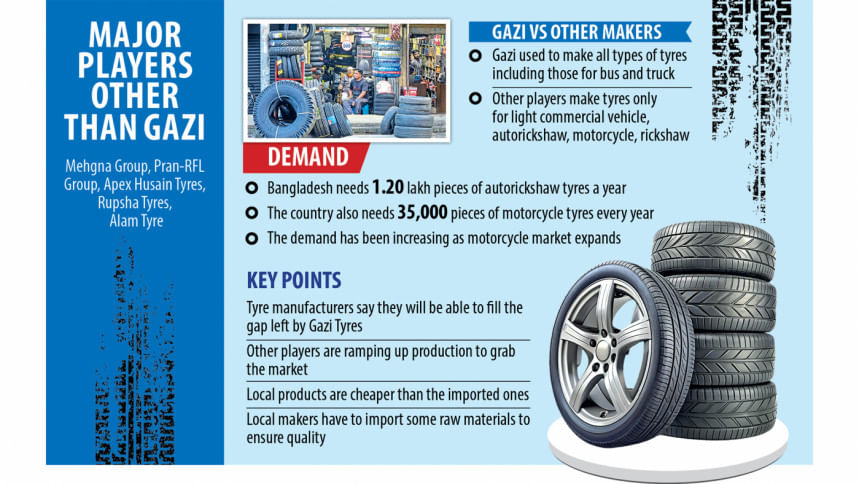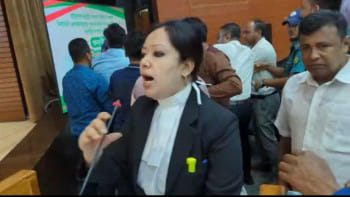Tyre makers gear up to fill void left by Gazi

Tyre makers in Bangladesh are ramping up production in a bid to expand their market share by catering to a potential supply shortage that may arise from the recent destruction of the Gazi Tyres factory in Rupganj upazila of Narayanganj.
Gazi Tyres met up to 70 percent of the country's overall demand for tyres used by rickshaws, three-wheelers and small commercial vehicles. It had also captured between 15 percent to 20 percent of the market for bus and truck tyres, and 65 percent in the minibus segment.
However, its production unit faced repeated attacks from looters and arsonists since the fall of the Sheikh Hasina-led Awami League government on August 5 because the company is owned by former Textile and Jute Minister Golam Dastagir Gazi.
With the factory now reduced to a pile of rubble, other tyre makers are looking to fill any supply shortages that may materialise within the next three months.
Industry people said their collective production capacity is capable of catering to more than double the country's annual demand.
Heavyweights in the sector include the Meghna Group of Industries, Pran-RFL Group, Apex Hussain Tyre, Rupsha Tyres and Chemicals Ltd, and Alam Tyre.
"We will utilise our maximum capacity to increase our market share in different tyre segments. We will be able to cater to about 70-80 percent of the total demand for small tyres," said Luthful Bari, director of operations at Meghna Group.
As such, they can easily cover the supply gap left by Gazi Tyres, he said, especially since MTF Tyres, a concern of Meghna Group, has been running below capacity.
"We previously used just 50-60 percent of our production capacity. Now, we will utilise 100 percent as it is the perfect time considering current market conditions," he added, informing that they can produce about 30 lakh rickshaw tyres each year at full capacity.
According to him, MTF Tyre already caters to 60 percent of the demand for motorcycle tubes and tyres. But now, the company's market share in this segment could expand to 80 percent.
Bari further said MTF Tyre alone is enough to meet most of the demand in the market.
Market insiders said Bangladesh needs roughly 1.20 lakh CNG tyres and 35,000 motorcycle tyres each year, with demand consistently on the rise due to the increasing use of two and three-wheelers.
Bari believes that like MTF Tyre, all other manufacturers in the industry will increase their production to capitalise on Gazi Tyres' absence.
Shafiqur Rahman, managing director of Rupsha Tyres, also said they would increase production capacity for the next three months to offset any supply shortage.
As a part of their efforts, he will soon open a letter of credit to import machinery to this end.
"After that, I will import the necessary raw materials as well," he added.
Rahman said they can cater to about 40 percent of the demand for CNG, motorcycle and easy bike tyres, with the company capable of meeting roughly 20 percent of the market's overall demand, excluding bus and truck tyres.
Rahman also said local manufacturers can now produce international standard tyres for two and three-wheelers. However, they have to import some raw materials to ensure the quality of those products.
"We import high-quality rubber sheets for motorcycle tyres to ensure their quality," he added.
Regarding the price of locally made tyres, he said domestic products are cheaper than imported ones, but they are of similar quality.
Kamruzzamn Kamal, marketing director of Pran-RFL group, said they entered the tyre industry just three years ago, which is why their market share is very low.
He explained that a vacuum is created in the market whenever any major player suddenly suffers a shock, providing others with the scope to expand their business.
"However, we are yet to make any decision about increasing production as a crisis is yet to emerge. It will take at least three months for a supply shortage to affect the market," he said.
"If we see that more products are required in the market, then we will increase production as we have unused capacity."
Kamal also said they are capable of catering to about 50 percent of the total demand for tyres with their existing production capacity.

 For all latest news, follow The Daily Star's Google News channel.
For all latest news, follow The Daily Star's Google News channel. 



Comments